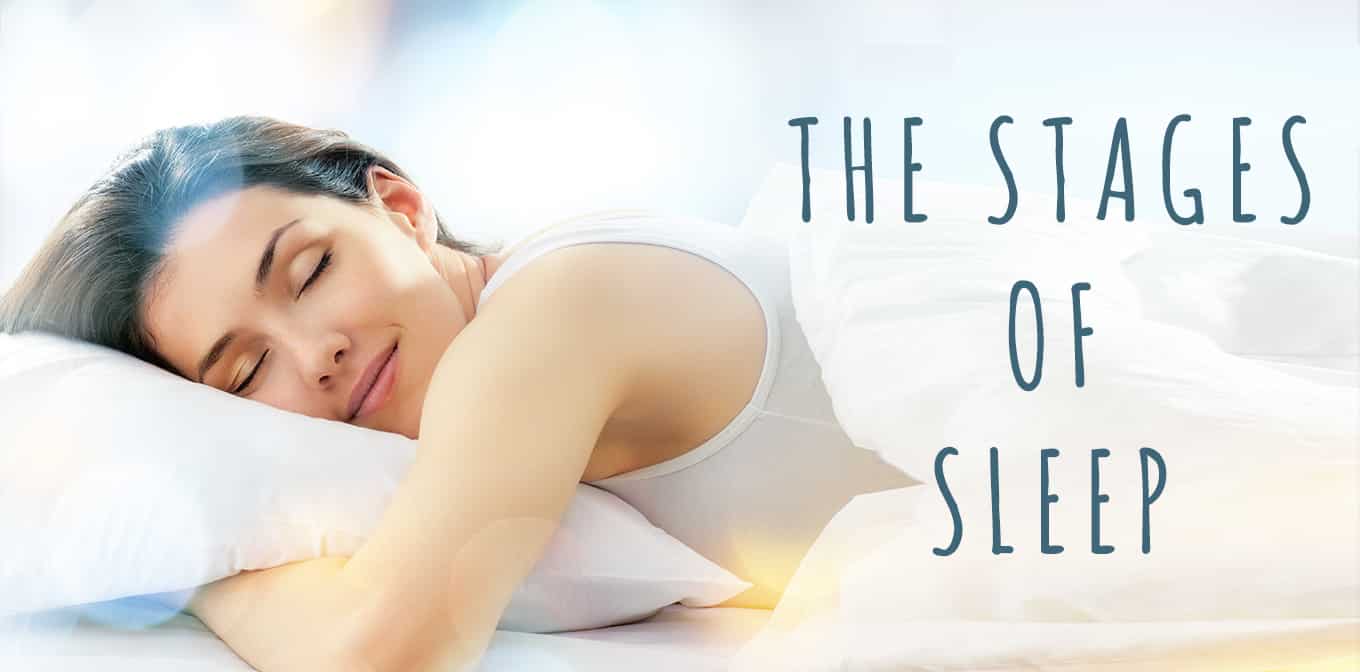One of the main problem people have in our society is sleep. This is due to many factors such as stress, anxiety, a health condition, the quality of food you eat, Wifi and other electromagnetic radiation etc. It is therefore important to understand how sleep works and to learn about the stages of sleep. Sleep is actually a complex process that occurs in a cycle of four stages with different level of brain activity for each stage. A complete cycle will usually last between 90 and 110 minutes. The first three stages of sleep are numbered and often classed as Non-REM (or NREM) sleep and the final stage is REM sleep.
Stage 1
Stage 1 is the transition from wakefulness to light sleep. This is the lightest stage of sleep when it is easy to wake people. During this first stage of sleep, muscle activity begins to slow, the eyes move slowly and many people experience muscle contractions, called “hypnic jerk”. Lots of people also experience a sensation of falling at this stage. Brain activity transitions from unsynchronized Beta and Gamma brain waves to the slower Alpha waves and then to Theta waves. Stage 1 generally lasts between 5 to 10 minutes.
Stage 2
In stage 2, eye movement completely stops. Records of brain wave measurements show that brain waves become slower, interspersed with just the occasional occurrence of rapid brain waves. Although the majority of the brain waves are Theta waves, like in stage 1, the bursts of rapid waves include Sigma waves, also known as “sleep spindles”, and short negative high voltage peaks caused by K-complexes. To prepare for deeper sleep, your heart rate slows down and your body temperature drops.
Stage 3
At stage 3, a person has extremely slow brain waves; these are called Delta waves. For this reason, this stage of sleep is often referred to as Delta Slow-Wave sleep or SWS. The Delta waves are occasionally interrupted by bursts or rapid brain waves. This is the deepest stage of sleep when it is more difficult to waken someone. All muscle and eye movement ceases during this phase. Also, blood pressure drops and hormones are released. If you are woken during this stage, it is likely you will feel temporarily disorientated or confused. Stage 3 is a particularly important stage of sleep as it is when your body repairs itself. For example, tissue growth and repair occur at this time. Also, if children experience night terrors or bedwetting, it is usually during this stage.
REM Sleep
REM (Rapid Eye Movement) sleep is the final stage in the cycle. It is important as it provides the body and brain with energy and this supports a person’s performance in the day. At this stage, the limb muscles are temporarily paralyzed, the eyes jerk rapidly and breathing becomes shallow, irregular and rapid. REM sleep usually begins after approximately 90 minutes of sleep. Brain waves are similar in activity to when a person is awake. Other physical manifestations during this stage of sleep include an increase in heart rate, a rise in blood pressure and a loss of ability to regulate temperature. Males may also develop erections during REM sleep. Dreams are most likely to occur during this stage which takes place between three and five times each night.
How Long is a Sleep Cycle?
It is worth noting that patterns of sleep change throughout a person’s life. As much as 50% of a baby’s sleep is REM sleep. This is much more than an adult as only 20% of their sleep is REM sleep with half of sleeping time spent in stage 2 and the other 30% of sleep time spent in the other stages. During old age, the amount of time spent in REM sleep progressively reduces as sleeping patterns change. The whole cycle of sleep usually lasts between 90 and 110 minutes regardless of a person’s age.
Sleep stages is a fascinating subject and the activity that takes place in the brain during sleep is astonishing. Although the sleep cycle is the same for everyone, people’s brain activity is never exactly the same. Individuals will spend different amounts of time at each of the stages of sleep and this may change throughout their life. Both non-REM and REM phases are important and each stage of sleep has a specific purpose for the body. They mostly have a regenerative effect on the various processes in the body. Therefore, good sleep is very important as it can help to improve concentration and productivity, to improve your immune function, to maximize athletic performance, to avoid health problems etc.
To train your brain to get into the Delta brain state, you may want to listen to sleep music embedding binaural beats that induce Delta waves:
Looking for more sleep music? Check out our Free Sleep Music page.
Please let us know if this article was helpful to you in the comments below.









